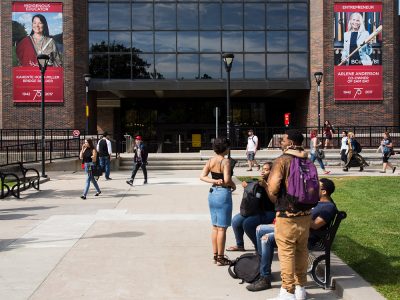Lead image by Doug Gordon / iStock
By Leah Levac, Jane Stinson and Leah M. Fusco
This article is republished from The Conversation under a Creative Commons licence. All photos provided by The Conversation from various sources.
Jane Stinson is an adjunct professor in work and labour at Carleton University.
Canada’s recent federal election was regularly dubbed one of the most consequential of the last 50 years. Economic and sovereignty threats from United States President Donald Trump were key issues in the campaign. In response, pledges about energy infrastructure and resource development played an important role in party platforms.
We have been studying impact assessments, the uneven consequences of resource development and sustainable energy transitions for over 15 years. We’re concerned about what and who may be overlooked as the government moves to become “an energy superpower,” in part by getting projects “done faster and better.”
We’re also interested in how the newly elected Liberal government can support more just energy transitions — that is, moving toward low carbon energy and economies that prioritize equity for workers and communities.
Challenges with Liberal promises
The Liberal Party platform includes renewed attention to an east-west energy corridor. It also promises to speed up and streamline the review of major resource projects and “get big projects built quickly” by “shifting the focus of project review from ‘why’ to ‘how.'”
The platform also promises more support for Indigenous participation in major projects and commits to using Gender-Based Analysis Plus — or GBA Plus — in policies and programs. GBA Plus is a method for assessing how diverse groups of people experience policies, programs and initiatives.
Through our research, we have advocated strongly for applying GBA Plus in the resource sector, including by centring community knowledge in impact assessments and proposing strategies for improving how Indigenous women’s experiences and knowledge are considered in impact assessments.
Over the last year, we also produced — along with our colleague Deborah Stienstra — two major research reports for the Impact Assessment Agency of Canada. Both were on the application of GBA Plus in regional assessments for offshore wind in Nova Scotia and Newfoundland and Labrador.
Regional assessments are a planning tool used before specific projects are proposed. They help identify important issues to consider if specific project assessments — for instance, for critical mineral mines, offshore wind projects or other resource developments — are conducted. If done well, regional assessments can help with more equitable and efficient project planning and development in the long run.
What do the findings from our work in this area suggest in terms of how the Liberal government should proceed with its energy vision?

Duty to consult
The 2019 Impact Assessment Act requires meaningful execution of the duty to consult with Indigenous people affected by a major economic development.
The Liberal Party made important promises to advance Indigenous participation in major projects and to double capacity support so more Indigenous communities can take an active role in project decisions at various stages.
But what the Liberal platform overlooks is Indigenous Peoples’ right to resist and refuse developments in their territories, or how specifically to ensure that Indigenous women and gender-diverse people are meaningfully engaged.
Moving forward, the Liberals must meet their constitutional duty to consult with Indigenous Peoples, while being guided by the United Nations’ principle of free, prior and informed consent per legislation that confirms Canada’s commitment to the UN’s Declaration on the Rights of Indigenous Peoples.
GBA Plus
During the campaign, the Liberal Party reiterated its support for GBA Plus by listing it as one of six key themes in its Make Canada Strong vision.
The Liberals seemingly recognize that GBA Plus is an important tool for advancing equity for women, gender-diverse people, people with disabilities and racialized people by:
“Identifying direct and indirect benefits of programs (e.g. job opportunities, access to programs and services) … and considering how these benefits will be distributed across diverse groups.”
The Liberal platform does not explicitly raise GBA Plus in relation to becoming an “energy superpower.” But GBA Plus has been gaining attention in the resource sector — particularly in relation to the development of specific projects — since the requirement to consider “the intersection of sex and gender with other identity factors” was included in the 2019 Impact Assessment Act.
GBA Plus needs to be applied in project-specific assessments (for specific developments, such as mines and hydroelectric dams) and in planning assessments (like regional assessments).
In our work on the regional assessments for offshore wind in Nova Scotia and Newfoundland and Labrador, we demonstrate the value of applying GBA Plus throughout all impact assessment processes.
Doing so helps strengthen community engagement efforts, identify potential effects early, determine the data sources required for monitoring those effects, fill data gaps and highlight barriers that prevent diverse groups of people from benefiting from energy projects.
For example, without adequate child-care options, many women cannot access the high-paying jobs that sometimes accompany resource projects. The Liberal government’s support for GBA Plus must therefore be explicitly incorporated into its energy proposals.
What and who is lost with fast tracking
A just energy transition is one concerned not only with planetary survival, but also with the effects of the transition on people who will be most affected.
The Liberal party’s vision for becoming an energy superpower includes “conventional energy resources” (like oil) as well as clean and renewable energy (like solar and hydro) and critical minerals needed to support decarbonization and energy transitions.
We disagree with the Liberal Party’s commitment to “shifting the focus of project review from ‘why’ to ‘how.'”
We need to ask how — and even whether — an energy project contributes to a just transition. Answering questions about whether projects will meet climate commitments and help advance equity for workers and communities is critical. These questions are best asked early, during planning phases and as part of regional assessments, before specific projects are proposed.
The duty to consult, GBA Plus and just energy transitions are interconnected and necessary commitments for sustainable energy production.
Together, they can contribute to a relationship with Indigenous Peoples that recognizes their sovereignty and to a more equitable and sustainable future. But these commitments cannot be meaningfully realized when fast-tracking development, because they require time and relationship-building.
Prioritizing fast-tracking — thereby falling short on these priorities and legal commitments — will backfire. It will lead to delays rather than more efficient processes, and will worsen existing inequities.
![]()
Tuesday, May 6, 2025 in The Conversation
Share: Twitter, Facebook



